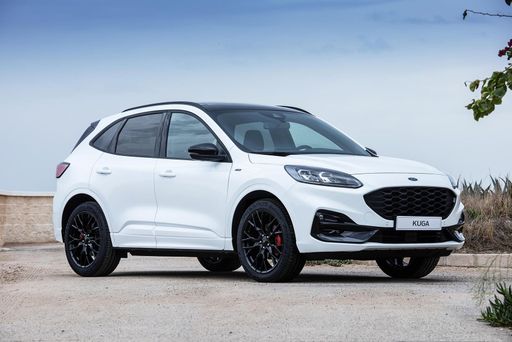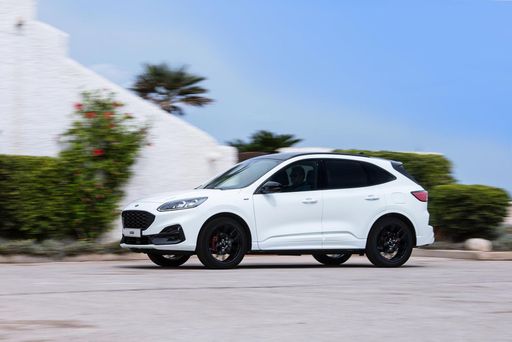Ford Kuga vs Toyota Yaris Cross - Differences and prices compared
Compare performance (243 HP vs 130 HP), boot space and price (34200 £ vs 23700 £ ) at a glance. Find out which car is the better choice for you – Ford Kuga or Toyota Yaris Cross?
Costs and Efficiency:
When it comes to price and running costs, the biggest differences usually appear. This is often where you see which car fits your budget better in the long run.
Toyota Yaris Cross has a significantly advantage in terms of price – it starts at 23700 £ , while the Ford Kuga costs 34200 £ . That’s a price difference of around 10551 £.
Fuel consumption also shows a difference: Ford Kuga manages with 2.80 L and is therefore decisively more efficient than the Toyota Yaris Cross with 4.50 L. The difference is about 1.70 L per 100 km.
Engine and Performance:
Power, torque and acceleration say a lot about how a car feels on the road. This is where you see which model delivers more driving dynamics.
When it comes to engine power, the Ford Kuga has a clearly edge – offering 243 HP compared to 130 HP. That’s roughly 113 HP more horsepower.
In acceleration from 0 to 100 km/h, the Ford Kuga is significantly quicker – completing the sprint in 7.30 s, while the Toyota Yaris Cross takes 10.70 s. That’s about 3.40 s faster.
In terms of top speed, the Ford Kuga performs slightly better – reaching 200 km/h, while the Toyota Yaris Cross tops out at 170 km/h. The difference is around 30 km/h.
Space and Everyday Use:
Beyond pure performance, interior space and usability matter most in daily life. This is where you see which car is more practical and versatile.
Both vehicles offer seating for 5 people.
In curb weight, Toyota Yaris Cross is distinct lighter – 1180 kg compared to 1526 kg. The difference is around 346 kg.
In terms of boot space, the Ford Kuga offers slight more room – 412 L compared to 397 L. That’s a difference of about 15 L.
In maximum load capacity, the Ford Kuga performs noticeable better – up to 1534 L, which is about 437 L more than the Toyota Yaris Cross.
When it comes to payload, Ford Kuga slight takes the win – 550 kg compared to 510 kg. That’s a difference of about 40 kg.
Who wins the race in the data check?
The Ford Kuga sits well ahead of its rival in the objective data comparison.
This result only shows which model scores more points on paper – not which of the two cars feels right for you.
Costs and Consumption
View detailed analysis
Engine and Performance
View detailed analysis
Dimensions and Body
View detailed analysis

Ford Kuga
Ford Kuga
The Kuga is Ford’s adaptable family SUV that blends usable space with a surprisingly lively driving character, making daily commutes and weekend escapes equally enjoyable. With smart interior packaging, an easy-to-use infotainment setup and composed road manners, it’s a sensible choice for buyers who want a bit of fun without the fuss.
details


Toyota Yaris Cross
The Toyota Yaris Cross takes the jaunty personality of the Yaris and gives it a taller stance and a bit more practicality, so you get city-friendly agility with added SUV presence. It’s easy to live with, economical on the daily grind, and smartly packaged — a sensible pick for buyers who want fuss-free transport with a touch of character.
details






Costs and Consumption |
|
|---|---|
|
Price
34200 - 46300 £
|
Price
23700 - 34300 £
|
|
Consumption L/100km
2.8 - 6.8 L
|
Consumption L/100km
4.5 - 4.8 L
|
|
Consumption kWh/100km
-
|
Consumption kWh/100km
-
|
|
Electric Range
68 km
|
Electric Range
-
|
|
Battery Capacity
1.1 - 14.4 kWh
|
Battery Capacity
-
|
|
co2
55 - 154 g/km
|
co2
101 - 108 g/km
|
|
Fuel tank capacity
42 - 54 L
|
Fuel tank capacity
36 L
|
Dimensions and Body |
|
|---|---|
|
Body Type
SUV
|
Body Type
SUV
|
|
Seats
5
|
Seats
5
|
|
Doors
5
|
Doors
5
|
|
Curb weight
1526 - 1859 kg
|
Curb weight
1180 - 1290 kg
|
|
Trunk capacity
412 L
|
Trunk capacity
320 - 397 L
|
|
Length
4604 - 4645 mm
|
Length
4180 mm
|
|
Width
1882 mm
|
Width
1765 mm
|
|
Height
1673 - 1681 mm
|
Height
1595 mm
|
|
Max trunk capacity
1534 L
|
Max trunk capacity
1097 L
|
|
Payload
541 - 550 kg
|
Payload
485 - 510 kg
|
Engine and Performance |
|
|---|---|
|
Engine Type
Petrol, Full Hybrid, Plugin Hybrid
|
Engine Type
Full Hybrid
|
|
Transmission
Manuel, Automatic
|
Transmission
Automatic
|
|
Transmission Detail
Manual Gearbox, CVT, Automatic Gearbox
|
Transmission Detail
CVT
|
|
Drive Type
Front-Wheel Drive, All-Wheel Drive
|
Drive Type
Front-Wheel Drive, All-Wheel Drive
|
|
Power HP
150 - 243 HP
|
Power HP
116 - 130 HP
|
|
Acceleration 0-100km/h
7.3 - 9.9 s
|
Acceleration 0-100km/h
10.7 - 11.3 s
|
|
Max Speed
195 - 200 km/h
|
Max Speed
170 km/h
|
|
Torque
240 Nm
|
Torque
-
|
|
Number of Cylinders
3 - 4
|
Number of Cylinders
3
|
|
Power kW
111 - 178 kW
|
Power kW
85 - 96 kW
|
|
Engine capacity
1496 - 2488 cm3
|
Engine capacity
1490 cm3
|
General |
|
|---|---|
|
Model Year
2025
|
Model Year
2024 - 2025
|
|
CO2 Efficiency Class
E, D, B
|
CO2 Efficiency Class
C
|
|
Brand
Ford
|
Brand
Toyota
|
What drivetrain options does the Ford Kuga have?
The Ford Kuga is available as Front-Wheel Drive or All-Wheel Drive.




